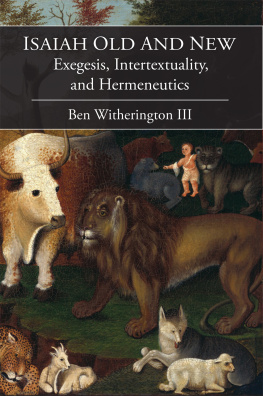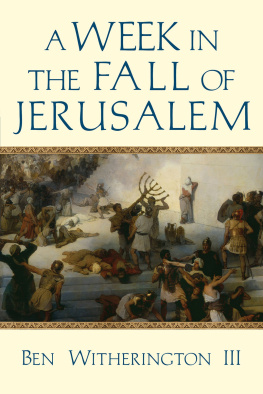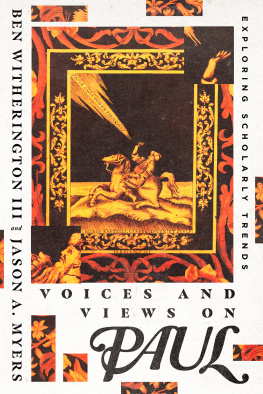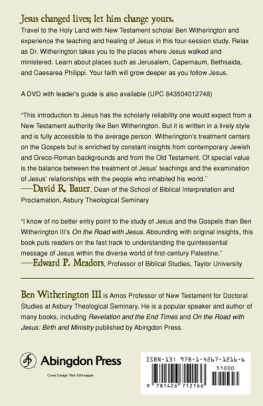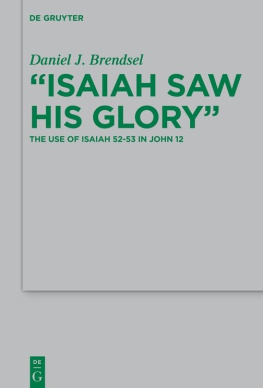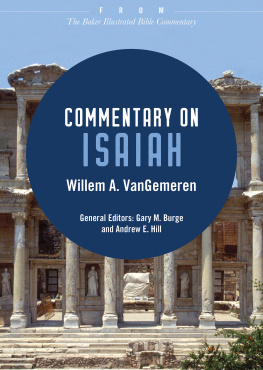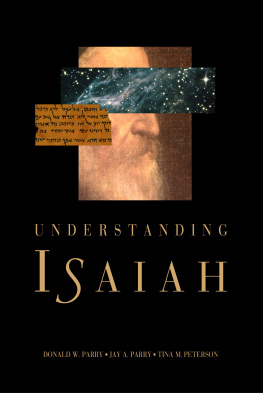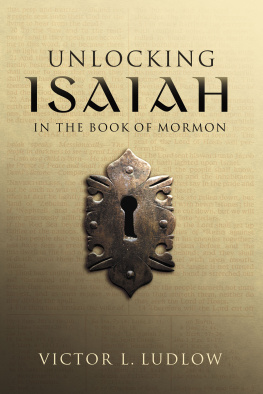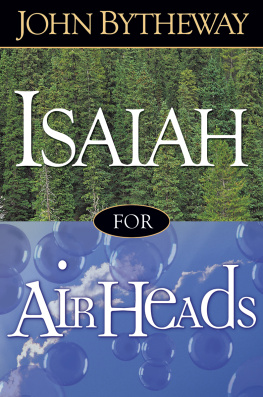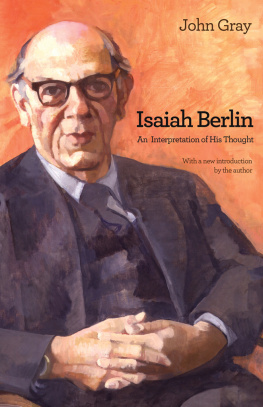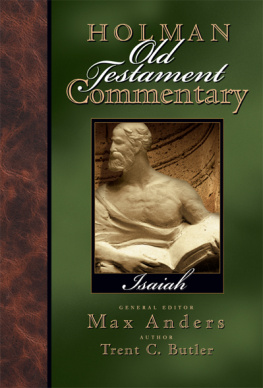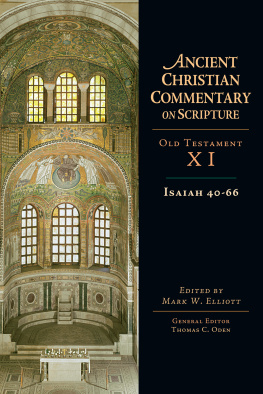Isaiah Old and New
Exegesis, Intertextuality, and Hermeneutics
Ben Witherington, III
Fortress Press
Minneapolis
ISAIAH OLD AND NEW
Exegesis, Intertextuality, and Hermeneutics
Copyright 2017 Ben Witherington III, admin. Fortress Press. All rights reserved. Except for brief quotations in critical articles or reviews, no part of this book may be reproduced in any manner without prior written permission from the publisher. Email copyright@1517.media or write to Permissions, Fortress Press, PO Box 1209, Minneapolis, MN 55440-1209.
Unless otherwise indicated, all Scripture quotations from the translation of the Masoretic Text of Isaiah are taken from the Holy Bible, New International Version, NIV, copyright 1973, 1978, 1984, 2011 by Biblica, Inc. Used by permission of Zondervan. All rights reserved worldwide (see www.zondervan.com). The NIV and New International Version are trademarks registered in the United States Patent and Trademark Office by Biblica, Inc.
All translations from the LXX are taken from A New English Translation of the Septuagint, 2007 by the International Organization for Septuagint and Cognate Studies, Inc. Used by permission of Oxford University Press; all rights reserved.
Cover image: Public Domain image: Edward Hicks The Peaceable Kingdom. https://commons.wikimedia.org/wiki/File:Edward_Hicks_-_The_Peaceable_Kingdom_-_Google_Art_Project_(723124).jpg.
Cover design: Joe Reinke
Print ISBN: 978-1-5064-2055-4
eBook ISBN: 978-1-5064-2056-1
The paper used in this publication meets the minimum requirements of American National Standard for Information Sciences Permanence of Paper for Printed Library Materials, ANSI Z329.48-1984.
Manufactured in the U.S.A.
This book was produced using Pressbooks.com.
Do you understand what you are reading? Philip asked.
How can I, he said, unless someone explains it to me?...
The eunuch [then] asked Philip, Tell me please, who is the prophet talking about, himself or someone else?
Then Philip began with that very passage of Scripture [Isaiah 5253] and told him the Good News about Jesus. (Acts 8:3031, 3435)
Concerning this salvation, the prophets, who spoke of the grace that was to come to you, searched intently and with the greatest care, trying to find out the time and circumstances to which the Spirit of Christ in them was pointing when he predicted the sufferings of the Messiah and the glories that would follow. It was revealed to them that they were not serving themselves but you, when they spoke of the things that have now been told you by those who have preached the gospel to you by the Holy Spirit sent from heaven. Even angels long to look into these things.
(1 Pet 1:1012)
Above all, you must understand that no prophecy of Scripture came about by the prophets own interpretation of things. For prophecy never had its origin in the human will, but prophets, though human, spoke from God as they were carried along by the Holy Spirit. (2 Pet 1:2021)
Without the New Testament, the Old Testament would be a labyrinth without a clue, a syllogism without a conclusion, a torso without a heart, a moon without a sun, since Christ is the proper interpreter of the Old Testament. (Franz Delitzsch)
Old Testament texts do not first derive their truth from the New Testament. That would be totally out of keeping with the spirit of Acts 8.3435. For Philip did not answer, This word is fulfilled in Jesus! Or The Servant of Isaiah 53 is Jesus Christ! Rather he took Isaiah 53:78 as the starting point of his proclamation, which in turn led him beyond this Scripture passage. His preaching about Jesus the Christ is, so to speak, a continuation of the book of Isaiah. (Bernd Janowski)
THE ORACLE
Call them forth,
Call them forth,
From the passive past.
The soothsayers and truth sayers
The yea sayers and nay sayers
The foretellers and forthtellers,
Scanning the skies,
Hoping for the horizon,
Acting out the plan
Signing forth the ban
Boon or bane
Commendation or condemnation
Blessing or curse,
Let them wrap their mantles
Round their hoary heads
And cry: Thus sayeth the Lord
Once more.
Ben Witherington, III
- Franz Delitzsch, Must We Follow the New Testament Interpretation of the Old Testament Text, in The Old Testament Student, 6 (1886): 7778.
- Bernd Janowski, He Bore Our Sins: Isaiah 53 and the Drama of Taking Anothers Place, in The Suffering Servant: Isaiah 53 in Jewish and Christian Sources, ed. Bernd Janowski and Peter Stuhlmacher (Grand Rapids: Eerdmans, 2004), 74.
Contents
A plethora of people have helped me understand Isaiah and its relationship to the New Testament over the last almost fifty years now. Dr. Bernard Boyd, my Bible Professor at UNC lit the fire, and Dr. Marvin Wilson at Gordon fanned the flame. John Rogerson at Durham showed me how to put more logs on the fire and keep it burning, and many OT colleagues along the way have kept handing me more Isaiah kindlingBill Arnold, Lawson Stone, Daniel Hawk, Daniel Johnson, John Oswalt, Sandy Richter, Katie Heffelfinger, John Cook, Michael Matlock, and so many more that Ive read over the many years of studying and teaching Isaiah. In regard to the issue of intertextuality I must thank my old friend Richard Hays and also Ross Wagner for pushing the envelope and making me open it in the first place.
This book would not have been completed in good time and in good order had it not been for the tireless services of my teaching assistant Joy Vaughan, who helped me so much with the revisions to the second edition of my Invitation to the New Testament. I must also thank Debbie Endean, another of our doctoral students, for weighing in on a part of this manuscript, and Kennedy Ekeocha, who provided two of the charts. Kudos to my old friend Todd Still and to Truett Seminary at Baylor for having me as a visiting professor during my sabbatical and for helping me find some hard-to-get resources for this book. The gaps and errors in this study are entirely mine. I hope that at least in a small way Isaiah 61 was true about me as I tried to write this booknamely, that the Spirit of the Lord was upon me to proclaim good news.
Pentecost 2016
| 1 Apol. | Justin Martyr, First Apology |
| ACCS | Ancient Christian Commentary on Scripture |
| ANE | Ancient Near Eastern |
| ANET | Ancient Near Eastern Texts. Edited by James B Pritchard. 3rd ed. Princeton: Princeton University Press, 1969. |
| Ant. | Josephus, Jewish Antiquities |
| B. Sanh. | Babylonian Talmud Sanhedrin |
| BDS | Bibal Dissertation Series |
| BECNT | Baker Exegetical Commentary on the New Testament |
| BETL | Bibliotheca Ephemeridum Theologicarum Lovaniensium |
| Bib | Biblica |
| BNTC | Blacks New Testament Commentaries |
| BSL | Biblical Studies Library |
| BWANT | Beitrage zur Wissenschaft vom Alten und Neuen Testament |
| BZAW | Beihefte zur Zeitschrift fur die alttestamentliche Wissenschaft |
| BZNW | Beihefte zur Zeitschrift fr die neutestamentliche Wissenschaft |
| CC | |

